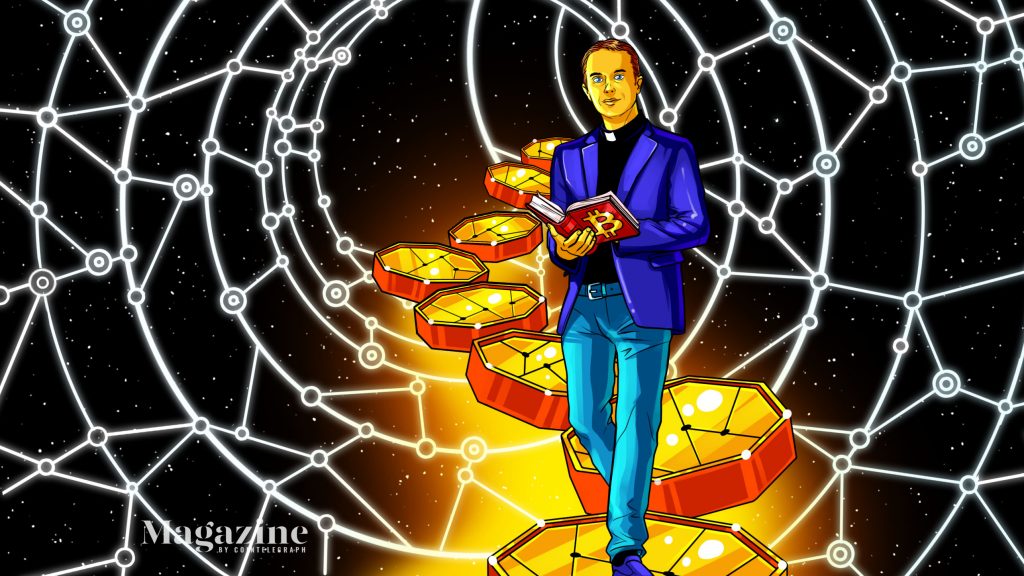“We felt like we were doing God’s work,” explains cryptocurrency payments pioneer Erik Voorhees as he recalls trying to convert the unbelievers in the early days of Bitcoin.
The man whose gambling platform SatoshiDice was once responsible for half of all Bitcoin transactions, is now an elder statesman of crypto and the CEO of the ShapeShift exchange.
He remembers Bitcoin being written off as a joke at the Money 2020 conference in Las Vegas back in 2012. At the time he was working for BitInstant, one of the first Bitcoin exchanges, and they had a booth right next door to PayPal.
“I remember the PayPal people nearby kind of snickering at us. A couple of them had maybe heard of Bitcoin. If they’d even heard about it, it was a total joke — a stupid scam on the internet, or something. It was a totally unproductive conference.”
History has not been kind to the snickerers and scam-sayers, many of whom have since been converted. In 2020, eight years after the conference, Paypal finally joined the fray, enabling users to buy and sell crypto, and it will soon add it as a method of payment at 29 million merchants.
Voorhees spread the gospel of Satoshi at the conference alongside Charlie Shrem and Roger Ver. Shrem was the founder of BitInstant, viewed by some as a martyr to the cause after serving two years in prison on a case related to an exchange user reselling Bitcoin on the darknet marketplace Silk Road. Ver was perhaps the biggest believer of all, earning the nickname ‘Bitcoin Jesus’ for his charismatic promotion of the currency.
“In terms of proselytizing, Roger was the absolute best. He was a total maniac about it” Voorhees recounts with a chuckle.
Even for Charlie and I, who were very much supportive of the general sentiment, It was pretty overwhelming and just incessant.
“Everyone that works at a startup feels a little bit like they’re changing the world, that they have this huge mission, and certainly every company tries to amplify that,” he says, being a CEO himself. But for Bitcoiners, Voorhees clarifies, “it is really a ‘change the world’ kind of thing, and to change the world on a fundamental level. It’s to change the institution of money itself — that is a profoundly tall order.”
Vorhees explains that he sees Bitcoin as nothing less than revolutionary:
“It’s not just a better user-interface for the money that people had before. It’s a different type of money that changes government, changes culture, changes social and economic relationships on a very very deep deep level. That’s why it’s taken so long to to catch on, to get recognized, because it is trying to move into such an entrenched institution.”
It's 2012. @ErikVoorhees @rogerkver and I decided to pool our money together for the first #Money2020 event. We told them we wanted the best booth we could afford, but we needed to be next to the @PayPal booth so we can show the world OUR financial system!
Welcome, Paypal! pic.twitter.com/5BzvQDfvFb
— Charlie Shrem (@CharlieShrem) October 21, 2020
Libertarian roots
Now 35, Voorhees spent his early ‘90’s childhood in the mountains of Colorado before moving to the University of Puget Sound near Seattle in 2003. He studied international economics and business but doesn’t really feel like he learnt either.
“In the entire major of economics, though I had courses in the history of economic thought, I never learned about the Austrians,” he says, referring to the Austrian School of economics. Often ignored by mainstream Keynesian economists, Austrians are obsessed with things like hard money and decry unbacked fiat currencies so they have been embraced by gold-bugs and the Bitcoin community, which is after all, often called ‘digital gold’.
A freshly minted graduate in 2008, Voorhees left to pursue adventure in Dubai where “anyone with a college degree could immediately get a job, because they were growing so fast.”
Working as a marketer for a real estate agency, he watched from a distance as the world he thought he knew began to buckle under the weight of the unfolding Global Financial Crisis. Dubai did not feel its effects until half a year later, he recounts, describing the intervening time as “this very weird period where Dubai was going through this massive economic boom, and the rest of the Western world was falling apart.”
From this desert oasis spared from the global drought, the business and economics graduate “started really understanding money on what I felt was a very fundamental level.” For Voorhees, the story of money is a simple one: “money emerges as the good that is bartered for most frequently.” That used to be gold and is currently fiat money, but it could just as well be something else, if a more useful and efficient money was embraced.
Upon this realization, Voorhees took on a “very strong aversion to fiat currency and to government control of money” because as a believer in a market economy, he felt that no government should control the price or distribution of any goods. “Money was actually the most important good of all, and thus most important to not be centrally planned. And yet it was even in, you know, allegedly capitalist economies,” he says.
A capitalist economy that has a government-managed money system seemed completely antithetical, but I didn’t have any answers or solutions to that other than some kind of return to the gold standard, which seemed somewhat anachronistic.
Voorhees returned to Colorado after two years abroad, soon moving to New Hampshire to join The Free State Project, an organized political migration which he describes as “a multi-decade initiative to move 20,000 radical libertarians to one small jurisdiction [New Hampshire] to hopefully have an outsized influence on the political structure.” It was there, in the company of fellow radical libertarian political activists, that Voorhees encountered Bitcoin in 2011.
“At that point I got completely hooked, and a year later ended up leaving New Hampshire and moving to New York to join Charlie Shrem at BitInstant.” There, he took the reins of marketing as employee number three.
It was around that time that Charlie Shrem, Roger Ver, and Erik Voorhees — each of whom would go on to become crypto-luminaries in their own right — pooled their money together to set up a Bitcoin booth at the Money 2020 conference in Las Vegas. “We needed to be next to the PayPal booth so we can show the world OUR financial system,” Shrem recounted. Vorhees says they failed to convert anyone to Bitcoin at the conference despite their best efforts.
Belief in false profits
Vorhees admits he used to be a Bitcoin Maximalist, a believer in the one true coin who rejected all false currencies. “I used to be a maximalist. Obviously when I got into Bitcoin, it was kind of the only coin,” he says.
As other coins came out I dismissed them, scoffed at them, and generally didn’t like them because I felt like they were a distraction from the important project.
Though he tried to focus on Satoshi’s vision, the new projects started gnawing at him and he realized that many of them “were doing things that Bitcoin wouldn’t do or couldn’t do.” By mid 2014, his conversion was in full swing.
“My whole mindset began changing. One of the most important things about Bitcoin is that it is decentralised. And it seemed to me antithetical to have a decentralized digital economy where there is only one chain — you know, one code base, one chain, one set of economic rules. It seemed very appropriate that you would get multiple different digital assets, and that was actually part of the decentralization, part of the virtue of Bitcoin was that Bitcoin isn’t the only thing there.”
He tempers this by adding the usual provisos — most tokens are garbage, many are scams, a majority will fail. “It’s only a minority of them that are interesting, but a minority is a lot more than one.”
ETH Folks… try not to become to Binancechain what the Bitcoin Maxis are to Ethereum 🙏
— Erik Voorhees (@ErikVoorhees) February 19, 2021
He still has empathy for his “shortsighted” maximalist peers, who he sees as victims of human nature’s tendency toward tribalism, which expresses itself in lots of ways, “Certainly it expresses itself in religion. And it has expressed itself in crypto, and some portion of people- their mind twists itself into complete advocacy of one flag and complete derision of all others.”
[It’s] a group psychological phenomena and I don’t know how that stops, but I do think it is really harmful for the growth of decentralized digital finance generally.
Gambling with Satoshi’s dice
Only a year after learning about Bitcoin, Voorhees launched Bitcoin-based gambling site SatoshiDice in 2012, which took the young crypto community by storm.
“On Reddit, this guy posted that he had created this casino-like mechanism where there’d be this dice roll, and based on the dice roll, a user would either get their coins sent back or lose them. I tried it, and there was magic in it immediately […] So I started working with him.”
This was groundbreaking because “it allowed any person in the world to place a bet by sending a Bitcoin transaction” no matter where they were from or how their local laws governed online gambling.
What’s more, the player did not need to trust SatoshiDice, because “it was provably fair,” meaning that it worked like a transparent machine where all odds and inner workings were open for anyone to inspect. Governments around the world have various commissions to regulate and audit gambling operations, but SatoshiDice’s function potentially made such organizations obsolete, powerless, or both.
SatoshiDice showed you what the odds were. It was transparent with the odds, and you could prove that the rules were fair.
The simple, trusted, and permissionless nature of SatoshiDice brought huge success to the platform. Within months of launch, the game was responsible for as much as half of all Bitcoin transactions.
SatoshiDice had an unofficial IPO on the MPEx exchange, a sort of Bitcoin stock market where unregistered Bitcoin companies offered shares and paid dividends denominated in BTC. These were the forerunner of the ICO boom several years later, and attracted similar attention from authorities for breaking securities laws.
Though the casino was “making a tonne of money,” it was also overwhelming as Voorhees felt his job of “running the world’s biggest Bitcoin casino” was distracting him from his greater calling of preaching the good word of Satoshi. Despite ongoing growth, he reluctantly sold the business in 2013 for 126,315 BTC which was then worth $12 million. That would be a cool $6.25 billion today.
Fighting the system
Voorhees did not enjoy calm for long, as the US Securities and Exchange Commission (SEC) soon came after him for making a public offering of unregistered securities. Voorhees considered this unfair, seeing that his investors had made exponential returns. He ended up settling for $50,000.
That was nine months of total misery, dealing with them. If I didn’t despise the government before, I certainly did it after that. It was such bullshit.
A core value of his is that people should be free to transact with each other voluntarily, and that no government agency has the right to come in between them. In his worldview, “institutions and government exist purely to curtail people’s power over money,” whereas “crypto gives people total economic power to make transactions in any way they wish, and no one can stop it.” As Voorhees sees it, these two forces will inevitably clash.

Voorhees’ company Shapeshift allows users to trade cryptocurrencies without identity verification. Things were not always that way — in 2018 Voorhees says his company fell under the same rules as traditional banks and therefore had to implement Know Your Customer, or KYC, identity verification procedures, making anonymous transactions impossible. “That was absolutely miserable. Our customers hated it. I hated it.”
But by 2020, decentralized exchanges (DEX’s) which allow users to trade without depositing their funds with a third party were gaining ground and made it possible for Shapeshift to reorient its business and re-align with its libertarian values. All KYC was abandoned, and the platform became a gateway for users to trade on various DEX’s. “I had learned with Satoshi Dice that an economic relationship didn’t need anything other than a public key to send in a transaction, and anything else could be based around that,” he says.
Voorhees says that his opposition to KYC is not down to ideology but his desire to protect users against things like identity theft.
“Identity theft in the US alone is something like a $30B to $40 billion a year problem. It is more costly than all forms of property theft combined. It’s this massive thing, and crypto comes along and solves that problem.”
But how committed is he to this principle? Would he class it as theft if a government accessed user data to tax a client’s unreported financial transactions. “Yeah, exactly. Taxation is absolutely theft,” he responds with blunt matter-of-factness.
The WSJ investigates
ShapeShift’s ethos has proven controversial among adherents to the rules and regulations around traditional finance. An investigation by the Wall Street Journal alleged Shapeshift users had laundered $9 million via the platform. However a third-party analysis by blockchain intelligence firm CipherBlade suggested the investigation was flawed in assuming that funds were illicit even after passing through four different hands, causing the $9 million figure to be inflated by a factor of four. It is clear that Voorhees, who is normally calm and composed, was deeply affected by this.
Here’s The Wall Street Journal coming after us, calling us the money launderer, when their own inflated number would put us as far better [at combating money laundering] than any of the major banks that they write about all the time.
There’s a noticeable quaver in his voice. The battle is personal.
We spend the last minutes comparing attitudes toward money in different societies. In the Nordic countries for example, all taxes are a matter of public record. Voorhees finds this disturbing, adding that “a lot of people with money feel guilty about it” whereas creating wealth in an ethical way he believes is a good thing for society.
“I would like to see people who become very wealthy, first of all be proud of that, so long as they did it in an ethical way, and to use those resources in whatever way they think is best. I think that’s how that’s how economies grow and I think there’s nothing wrong with that.”

Elias Ahonen
Has altseason finished? XRP ETF applications flood in, and more: Hodler’s Digest, Feb. 2 – 8
Is altcoin season potential still alive or running out of steam? XRP ETF filings flood in, and more: Hodler’s Digest
Read moreNew Year’s wishes for the young, ambitious blockchain community
To celebrate the new year of 2022, we collected inspiring wishes for the blockchain community from crypto industry insiders.
Read moreChina’s 100K TPS blockchain, Japan’s Minna Bank eyes Solana: Asia Express


